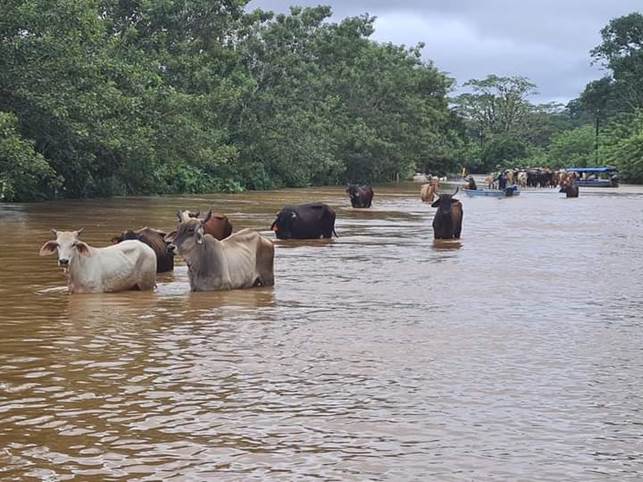The National Animal Health Service (SENASA), of the Ministry of Agriculture and Livestock, preliminarily reports on the impact of more than 90 thousand farm animals, more than 6000 pets and around 1600 farms that suffered flooding , after the rains of the past few days.
These results are estimated, in a preliminary way, based on the Integrated System of Registration of Agricultural Establishments (SIREA), because in some places it has not yet been possible to enter the affected farms to assess the damages, due to the adverse weather and access conditions.
Reports from temporary shelters for people are also expected, whenever the presence of pets are verified, and wherever the required veterinary attention was provided.
As part of the aid provided to the animals, in Naranjales de Sarapiquí 655 canines and 79 felines have been treated and 1,100 kilos of food for companion animals (canines, felines) have been distributed, thanks to a donation from a group of rescuers from the area which represents an important collaboration. It is also estimated that the affected canine and feline population is over 6000.
SENASA requests the collaboration of individuals and private companies, since there are still many affected animals that require help. Food is needed for dogs, cats, rabbits, chickens, cattle, as well as leashes, bibs, blankets, containers for water and food.
Donations are being received this week at the SENASA headquarters located in Lagunilla de Heredia and at all Regional Offices throughout the country, from 8:00 am to 3:00 pm.
Likewise, people who own farm animals are recommended to keep them away from areas vulnerable to landslides and floods. Shelter them and move them to high, safe areas, with enough food for a week and have an emergency plan to maintain sanitary control of their animals, in order to avoid the spread of diseases.
Pets must be identified and with current vaccination cards. It is advisable to have a kit that includes a leash, food containers, drinking water, medications that the animal requires, and food for 15 days.
For felines, it is suggested to use a carrier or a double pillowcase. Also, do not leave your pets tied up in areas that can cover the water, look for relatives or neighbors who can take care of it, check if the shelter where you will be transferred allows you to take your pets, but do not leave it unattended or on your own, because they could be lost, hit, or killed.
Rules of coexistence for pet owners in evacuation shelters:
• The owner is responsible for his pet:
• Food and hydration.
• Cleaning your space.
• Care that it requires.
• Treatments for illnesses and medications.
• Restraint or containment of the animal to prevent accidents.
• Cleaning and disposing of feces and urine.
• You should avoid contact of your animal with other animals and other people.Likewise, if the pet is without vaccination or with any disease, you must indicate it to the person in charge of the shelter before entering with the animal. On the other hand, the abandonment of animals in these shelters will be reported to the competent entities and is considered animal abuse, with a penalty of 20 to 50 days fine.










